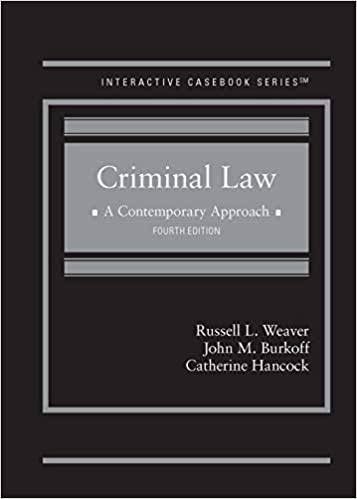Question
Read the following Case Study and respond to the questions below using concepts of legal thinking to support your responses. Childs v. Desormeaux On New
Read the following Case Study and respond to the questions below using concepts of legal thinking to support your responses.
Childs v. Desormeaux On New Year's Eve, 1998, Julie Zimmerman and Dwight Courrier hosted a Bring Your Own Bottle (BYOB) house party for relatives and friends. Courrier's friend Desmond Desormeaux was among the invited guests. Desormeaux was a self-described alcoholic with two prior impaired driving convictions. He also had an earlier conviction in 1996 for driving while his license was suspended. In the past, Desormeaux had frequently slept over at the hosts' house when he had too much to drink, or had taken a taxi home. This time, he did neither.
At about 1:30 a.m. on January 1st, 1999, Desormeaux left the party. He drove his car into oncoming traffic, colliding head-on with another car. Seventeen year-old Zoe Childs and her boyfriend, Derek Dupre, were riding in the back seat of the other car. Dupre was killed, and Childs's spine was severed, rendering her paraplegic. All of the other passengers in both cars were seriously injured. Desormeaux's blood alcohol sample taken following the accident was more than twice the legal limit. He pleaded guilty to criminal charges arising from the accident. He received a 10-year prison sentence.
Childs sued Desormeaux and his two hosts for $6 million in damages. The trial judge held Desormeaux liable for damages to Childs and the other plaintiffs. He dismissed the action against the hosts. He stated that the provincial governments should pass laws to determine social host liability.
Childs appealed the decision to the Ontario Court of Appeal. It also dismissed her claim in a unanimous judgement in May 2004. She then appealed to the Supreme Court of Canada. In a 7-0 decision on May 6, 2006, the high court dismissed her appeal.
In its unanimous decision, the Ontario Court of Appeal rejected Childs's appeal for the following reasons:
1. It was a BYOB party, and the hosts did not provide or serve the alcohol.
2. They had no idea how much Desormeaux was drinking.
3. They did not know that Desormeaux was impaired when he drove away from the party.
Question's
1.Do you agree with the Ontario Court of Appeal's reasoning and decision? Explain your reasoning using the concept of "Legal Perspective" to help support your response.
In the Supreme Court judgment, Chief Justice McLachlin wrote: "As a general rule, a social host does not owe a duty of care to a person injured by a guest who has consumed alcohol...A person who accepts an invitation to a party does not park his autonomy (freedom) at the door. The guest remains responsible for his or her conduct."
2.Using one of the four concepts of legal thinking, explain whether or not you agree or disagree with the Supreme Court's decision.
Step by Step Solution
There are 3 Steps involved in it
Step: 1

Get Instant Access to Expert-Tailored Solutions
See step-by-step solutions with expert insights and AI powered tools for academic success
Step: 2

Step: 3

Ace Your Homework with AI
Get the answers you need in no time with our AI-driven, step-by-step assistance
Get Started


